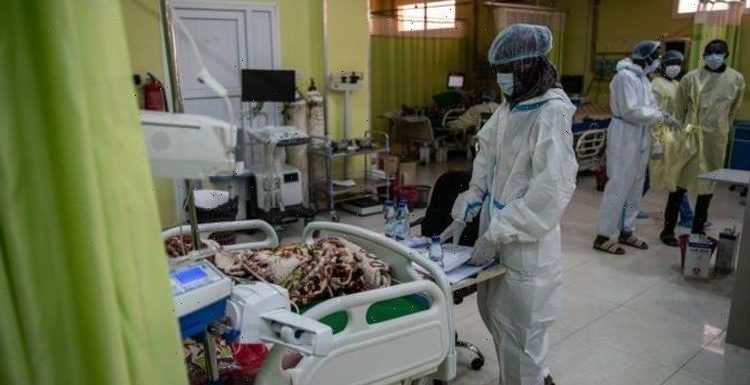
South Sudan: ‘Billions’ of locusts land in Magwi
We use your sign-up to provide content in ways you’ve consented to and to improve our understanding of you. This may include adverts from us and 3rd parties based on our understanding. You can unsubscribe at any time. More info
The “strange” illness has symptoms including diarrhoea, headaches, and loss of appetite, according to Fangak County commissioner, Biel Boutros Biel. The WHO sent a “rapid response” team to investigate the illness linked to the deaths, in Fangak, according to the WHO Africa spokesperson. But Mr Biel said that the organisation left the area without revealing their findings to local officials.
He told ABC News: “WHO didn’t tell us yet what could the strange disease and its causes be.
“We hope WHO will identify the disease and tell us the way forward.”
While little is known about the virus, the South Sudan Ministry of Health has identified that the illness appears to mainly affect the elderly and children under 14.
An elderly woman was the latest casualty, bringing the death toll up to 97.
South Sudan has also recently been devastated by some of the worst flooding seen in the country in nearly 60 years


More than 700,000 people have been affected, according to the U.N. refugee agency UNHCR.
That is why the WHO suspects the mystery illness might be a waterborne disease.
The flooding was so disruptive that WHO officials had to arrive in Fangak via helicopter.
Sheila Baya, from the WHO, told BBC News: “We decided to send a rapid response team to go and do risk assessment and investigation; that is when they will be able to collect samples from the sick people – but provisionally the figure that we got was that there were 89 deaths.”
WHO officials reportedly took samples from patients for cholera, which is typically contracted from infected water supplies.

But the samples reportedly came back negative for the infectious bacterial disease.
In the bordering state of Unity, severe floods have increased the spread of diseases such as malaria and caused malnutrition in children due to food shortages.
Last month, the international humanitarian group Médecins Sans Frontières (MSF) issued a statement that called the floods the “perfect storm” for disease outbreaks.
The statement read: “People do not have enough water or options for water storage, and there is no garbage collection, while dead goats and dogs are left rotting in the drainage systems.
DON’T MISS
Elon Musk sparks China fury over near miss space station collision [REVEAL]
Archaeology breakthrough after human remains found in Aztec pyramid [INSIGHT]
Covid horror as ANOTHER new variant discovered in France [REPORT]


“With the conditions further worsened by the influx of new arrivals [at camps], people are at higher risk of outbreaks and waterborne diseases such as acute watery diarrhoea, cholera and malaria.”
This also comes nearly two years after the WHO reported a mystery illness that was likely to be caused by a new virus that was giving people mysterious pneumonia cases in the city of Wuhan.
We now know, of course, that the mysterious illness was COVID-19.
December 31 marks the two-year anniversary of the novel coronavirus case being reported to China’s WHO office.
The WHO has been contacted for comment.
Source: Read Full Article